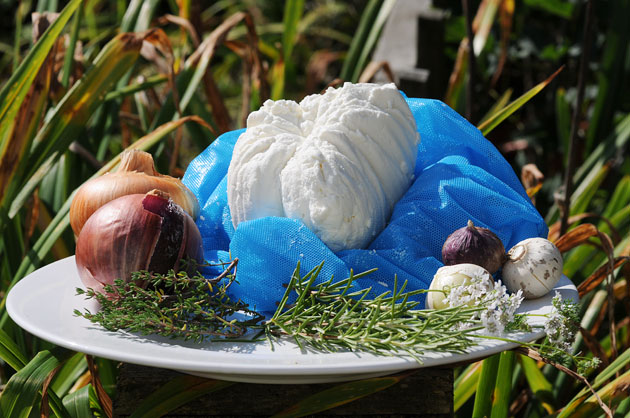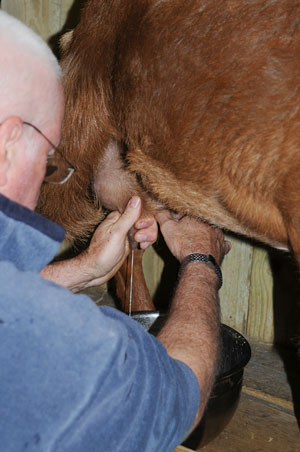Welcome to Relaxed Farming
- Alpacas
- Chickens
- Dairy Goats
- Ducks
- Geese
- Pigs
- Pygmy Goats
- Quail
- Rabbits
- Sheep
- Turkeys
- Polytunnel
- Photo Stories
- Video Stories
- Food
- Smallholding Map
Relaxed Farming Food: Cheese
| Click to return to the previous page... |
| Cheese making is back on the schedule - and this year we are trying a new recipe - a chevre (French for goat's cheese - the apostrophe is after goat as we are only milking one of our dairy goats - Pickle) which is really easy to make. The main focus in all cheese making is cleanliness, all the pans, containers and ladles need to be thoroughly washed and, in our case, popped on top of the Rayburn for an hour or so to get dry and hot (heat kills off bacteria!). We have four litres of milk which has been collected over two days, the early milkings being kept in the fridge. The milk is strained through a fine mesh to remove any hay, straw or other bits and pieces - it is then slowly heated to 30°C, at which point the chevre 'starter' is added, stirring thoroughly. Stay with the next bit, it gets a tad complicated - the starter consists of mesophilic bacteria which grow best at low temperatures, converting the lactose (milk sugar) into lactic acid which helps to 'set' or form the curds (the milk has now separated into curds - solids, and whey - liquid). After 12 hours the curds are carefully ladled into a muslin bag (leaving the liquid whey to be added to the compost heap) and allowed to drain for a further 12 hours. The curds are then popped into the fridge for yet another 12 hours before being ready to eat... The cheese is then spread on biscuits and devoured! Utterly delicious!! Fresh chevre goat cheese plus garlic, onions (red and white) and a few herbs!
 |
Most cheese sold in this country is made from pasteurised milk - this is milk which has been heated to kill off harmful bacteria (a process first developed by Louis Pasteur in 1864). Cheese which is made from unpasteurised milk is not recommended for people who have weakened immune systems, older adults, pregnant women or children!
We are milking Pickle twice a day and getting about one litre each time - when she hears the feed bucket rattle she runs up from the paddock, jumps onto the miliing bench and starts eating - allowing us to milk her whilst listening to our favourite radio station!  |